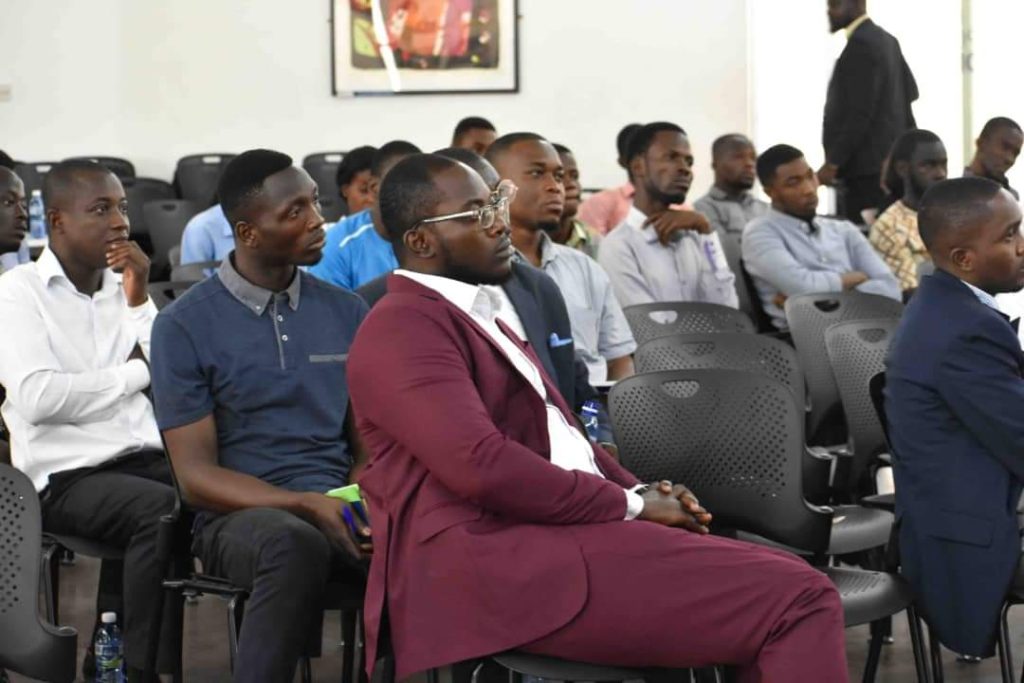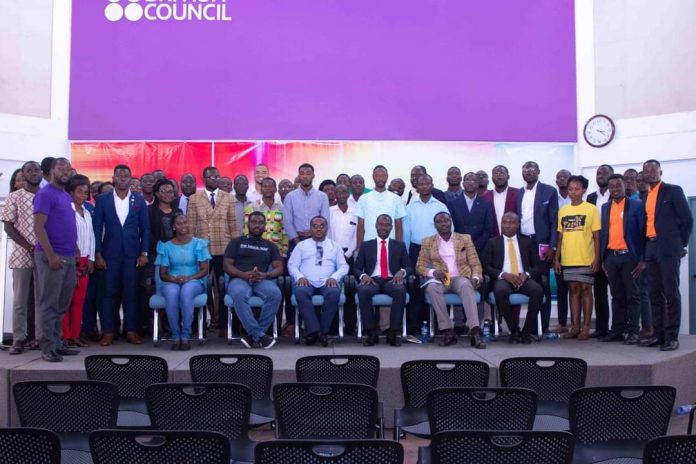Author: Amos Dankwa
In 2017, a significant movement began within Ghana’s entrepreneurial landscape, championed by Justice Offei Jr., a visionary committed to the growth and sustainability of startups in the country.
Through his think tank, Africa Entrepreneurship Dialogue (AfED), Justice Offei Jr. initiated a comprehensive sensitization campaign aimed at highlighting the necessity of a Ghana Startup Act.
The Beginning Of A Movement
Justice Offei Jr.’s advocacy for the Ghana Startup Act was rooted in a deep understanding of the challenges faced by startups in Ghana.
The aim was to create a legislative framework that would provide a conducive environment for startups to thrive, thus fostering innovation, creating jobs, and contributing to the country’s economic growth.
To kickstart this movement, Justice embarked on a visiting tour, engaging with key stakeholders across the entrepreneurial ecosystem.
One of the pivotal moments in this journey was Justice’s visit to the CEO of the National Entrepreneurship and Innovation Programme (NEIP).
NEIP, a government initiative supporting entrepreneurship, became a crucial ally in this advocacy. The visit culminated in an official invitation to the NEIP CEO for the grand launch of the Ghana Startup Act Advocacy.
The Launch of the Advocacy Campaign
The official launch of the Ghana Startup Act Advocacy took place at the British Council Auditorium in Accra.
Thanks to the selfless and hardworking team at AfED, the event was a resounding success, attracting a large audience comprising young entrepreneurs and key stakeholders.
The presence of the NEIP CEO was a testament to the government’s initial support for the initiative.













The launch event was not just a gathering; it was a clarion call to action. Media coverage of the event was extensive, with various media aggregators and publications spotlighting the need for a dedicated startup act.
This media attention played a crucial role in setting the tone for continuous discourse on the subject, ensuring that the conversation remained at the forefront of public and governmental attention.
The Need For A Unified Ecosystem
Justice Offei Jr. has always been an advocate for unifying efforts within the entrepreneurial ecosystem.
Recognizing the importance of a cohesive approach, he invited the Ghana Chamber of Young Entrepreneurs (GCYE) and NEIP to form a tri-party lead to ensure adequate funding for the development and enactment of the Ghana Startup Act.
This tri-party effort was designed to pool resources and influence, creating a stronger push for the legislative framework.
However, due to unfair internal politics, Justice and AfED were sidelined and excluded from the tri-party approach. Despite this setback, the Ghana Startup Act has made significant progress.
Support from development partners, including the German Agency for International Cooperation (GIZ), has been instrumental in advancing the act.
Nonetheless, Justice Offei Jr. has been excluded from the working group for the Ghana Startup Act due to a lack of recognition for the foundational work and investment by Justice and AfED.
Commitment To The Cause
Despite these challenges, Justice Offei Jr. and AfED have demonstrated unwavering commitment to the cause. They have continued to contribute to the discourse and shaping of the Startup Act by holding annual stakeholder dialogues on how the context of the Act should be framed to address the institutional voids in the ecosystem.
In a notable effort, AfED hosted the founding members of the Tunisia Startup Act in a dialogue to share their experiences and advice. Tunisia was the first African country to enact a Startup Act, providing valuable insights for Ghana’s journey.
There is ample evidence in media publications from 2017 and beyond that underscore Justice Offei Jr. and AfED’s role as the original initiators and committed advocates of the Ghana Startup Act.
Articles such as those published by Modern Ghana and Business World Ghana highlight their foundational work and the personal resources invested in this cause.
The Importance of the Ghana Startup Act
The primary objective of the Ghana Startup Act is to establish a legal and institutional framework that addresses the unique needs of startups. Such a framework is essential for several reasons:
• Regulatory Clarity: The act would provide clear guidelines and regulations tailored to the startup ecosystem, reducing the bureaucratic hurdles that often stifle innovation.
• Access to Funding: A well-defined legal framework would facilitate access to funding by creating trust and transparency, encouraging both local and international investors.
• Support Systems: The act would institutionalize support systems such as incubators, accelerators, and mentorship programs, which are vital for the growth and development of startups.
• Incentives: Providing tax breaks, grants, and other incentives would encourage more individuals to venture into entrepreneurship, fostering a culture of innovation.
• Job Creation: By supporting startups, the act would contribute significantly to job creation, addressing the high unemployment rates among the youth.
The Need for Government Action
While the launch of the advocacy campaign was a significant milestone, the journey towards the enactment of the Ghana Startup Act is far from over.
The government’s role in this process is crucial. Ensuring the enactment of the act would demonstrate a commitment to nurturing the entrepreneurial spirit within the country. Here are key steps the government needs to take:
• Policy Formulation and Stakeholder Engagement: The government should actively engage with all stakeholders, including startups, investors, and support organizations, to formulate a comprehensive policy that reflects the needs and aspirations of the entrepreneurial community.
• Legislative Action: The government must prioritize the drafting and passage of the Ghana Startup Act in parliament. This requires political will and recognition of the act’s potential to drive economic growth.
• Implementation and Monitoring: Once enacted, the government should establish mechanisms for effective implementation and monitoring of the act, ensuring that its benefits are realized across the startup ecosystem.
• Public Awareness Campaigns: Continuous public awareness campaigns are essential to educate entrepreneurs about the provisions of the act and how they can leverage it for their growth.
In concluding, the genesis of the Ghana Startup Act, spearheaded by Justice Offei Jr. and AfED, marked a significant turning point in Ghana’s entrepreneurial journey. The advocacy efforts have laid a solid foundation, but the enactment of the act is the next critical step.
It is imperative for the government to recognize the act’s importance and take decisive action to ensure its passage and implementation.
Doing so will not only support the growth of startups but also propel Ghana towards becoming a hub of innovation and entrepreneurship in Africa.
By Amos Dankwa
References
• The Ghana Startup Act: Building the Next Giants of Enterprise
• Manifesto Season: AfED Pushes for Policy Framework
• The Sikadan Story and the Fight for a Startup Law in Ghana











































